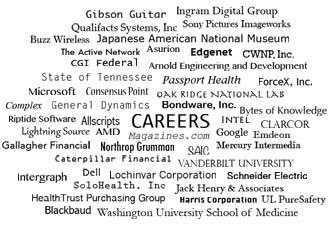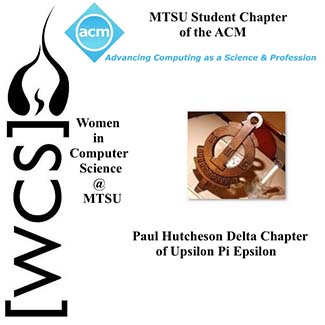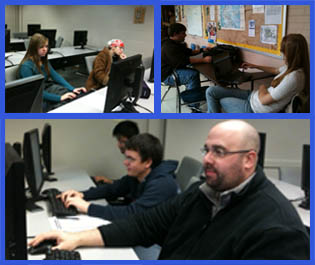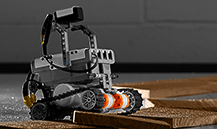Prospective Students
|
|
Exciting Student Activities |
|
|
|
Excellent Career and Internship Possibilities |
 |
|
|
|
 |
Professional and SocialClubs and Organizations |
|
|
|
Challenging Coursework |
 |
Comparison of computer related departments / majors at MTSU:
| Computer Science | Computer Scientists write computer programs. These could be anything from mobile apps to complex databases to websites to high performance scientific computing and more. While they frequently have to work in teams to develop these programs, they may also spend long hours working independently to debug and develop the software. See our career page for information on careers in Computer Science | Computer Scientists are first and foremost problem solvers. While they must be able to work in teams, they must also be extremely capable of solving problems on their own and teaching themselves new technologies. While it is not a necessary attribute, it is interesting to note that many Computer Scientists are also accomplished musicians and/or mathematicians. | Students should take as much math in high school as possible. If the high school offers a programming class, taking it would also be a good idea. |
| Information Systems and Analytics | Information systems is where business meets technology. Individuals are exposed to a variety of opportunities that range from creating and managing web applications to projects involving the design and implementation of network environments. Individuals work in positions such as web developer, application developer, business or systems analyst, project manager, database analyst or administrator, network manager or network administrator, information systems auditor. | Information systems professionals work to solve the needs of organizations of all types and sizes. They are responsible for taking business needs and designing and creating solutions to those needs with the use of technology. These roles combine expectations of teamwork as no successful system can be designed in isolation. Individuals can take on the roles mentioned in the previous column. Expectations of the field in general are 1) to expect things to change and 2) to be motivated by that environment. | Students should have knowledge of basic computer function and structure. They should understand the potential of systems and to do so requires creativity. Students should be able to articulate information clearly to others and have strong communications skills. Students are not expected to have the specific knowledge the program will provide: networking, database, web development, application development, etc., but a understanding is helpful. Students would also benefit from any business related classes in high school. |
| Media Arts |
The professional fields covered by the Media Arts department include:
|
Professionals working in these diverse fields have a passion for working in and creating media. This is a highly collaborative arena with many specialized functions as exhibited by the extensive credits one can see in the credits for movies, TV shows, and video games. These fields are in a constant state of change, so the ability to adapt and continually learn new things is important. |
Students benefit from a variety of skills and knowledge:
|
| New Media Communication | The New Media Communication program helps prepare students to embrace the technology changes that are happening nearly every day. Are you wired into the landscape of social and mobile media, websites, blogs, and apps? Advances in hardware and software and new forms of distribution are causing the greatest explosion of creative activity in human history. Anyone can be a publisher today, and business is scrambling to find enough of the right people to fill the new jobs that are being created. Our New Media program is all about combining the fundamentals of effective communication with new techniques and technologies. | New Media Communication specialists focus on the human side of media; messaging, user experience, and communication strategy. Creation of media content; text, audio, video, graphics; for websites, social media, and mobile applications is a major part of the work done in this field. Graduates work in anything from a small boutique advertising firm or software startup to Fortune 500 corporate communications departments. |
Students benefit from a variety of skills and knowledge:
|
ComputerScienceOnline.org provides a wealth of information about Computer Science degree programs and careers (including salary data).




